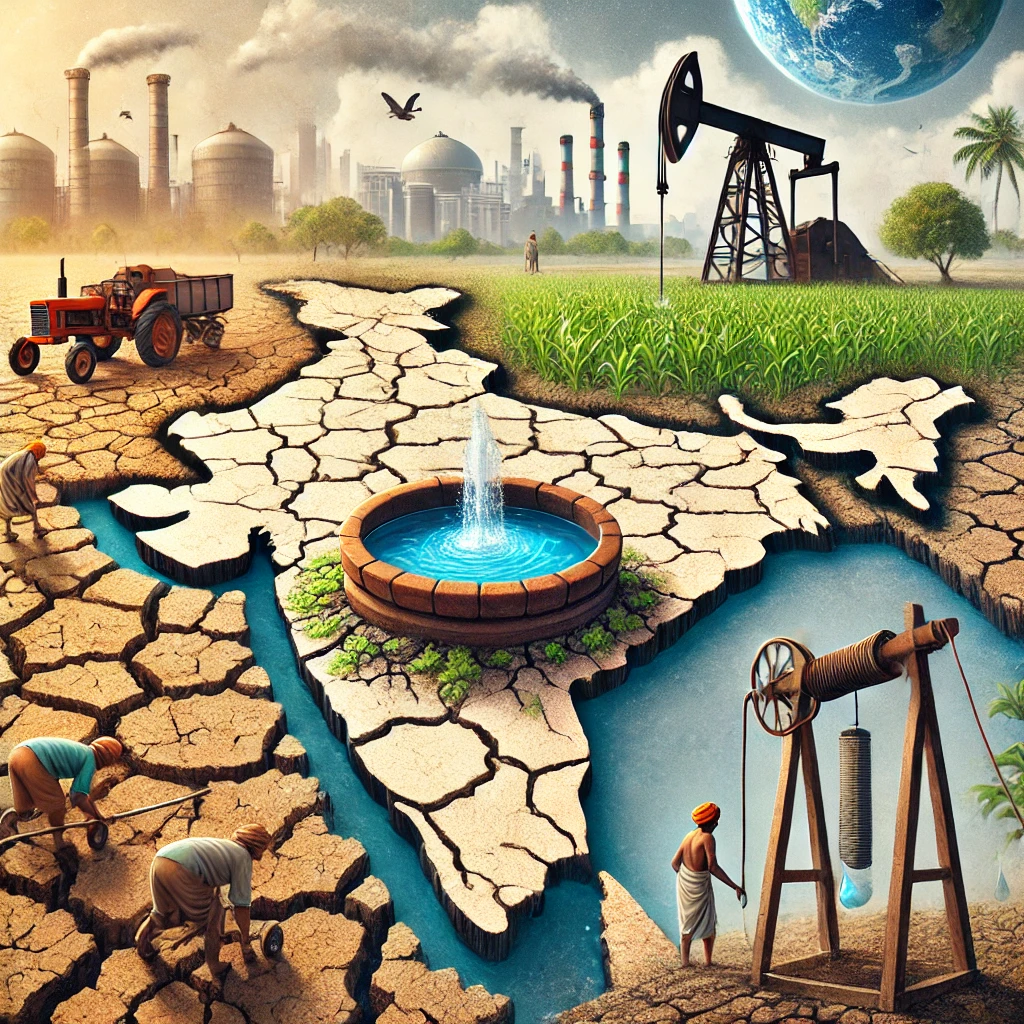India’s Groundwater Extraction Reaches Critical Levels
Groundwater depletion has reached alarming levels in several Indian states, particularly where agriculture is the primary economic driver. Reports indicate that in 2024, groundwater extraction in some regions exceeded replenishable limits by over three times.
India’s Groundwater Resources: Key Insights
According to the latest ‘National Compilation on Dynamic Ground Water Resources of India 2024’ by the Central Ground Water Board (CGWB), India’s total annual groundwater recharge was assessed at 446.90 billion cubic meters (BCM). After accounting for natural discharge, the extractable groundwater stood at 406.19 BCM, while the total groundwater extraction was recorded at 245.64 BCM, resulting in an average extraction rate of 60.47% across the country.
Agriculture: The Biggest Consumer of Groundwater
The agriculture sector dominates groundwater consumption, utilizing 87% of the total extracted groundwater (213.29 BCM). Domestic and industrial sectors account for 11% (28.07 BCM) and 2% (4.28 BCM), respectively.
States with Highest Groundwater Overexploitation
Several states have reported critical groundwater depletion in 2024, with extraction levels exceeding 100% of the available recharge.
1. Punjab: Severe Groundwater Depletion
Punjab, despite being a river-rich state, faces severe groundwater overexploitation.
- Total groundwater recharge: 19.19 BCM
- Extractable groundwater: 17.63 BCM
- Annual groundwater extraction: 27.66 BCM
- Groundwater extraction rate: 156.87%
Sangrur district reported the highest extraction rate at 313.24%, making it the worst-affected region in the state. Around 75.16% of Punjab’s 153 groundwater assessment units have been categorized as ‘overexploited’.
2. Haryana: Groundwater Extraction Exceeds Limits
Haryana also faces a serious water crisis due to unsustainable groundwater usage.
- Total groundwater recharge: 10.32 BCM
- Extractable groundwater: 9.36 BCM
- Annual groundwater extraction: 12.72 BCM
- Groundwater extraction rate: 135.96%
Kurukshetra district leads in overexploitation, with groundwater extraction at 228.42%. Around 61.54% of Haryana’s 143 assessment units have been classified as overexploited.
3. Rajasthan: The Most Overexploited State
Rajasthan recorded one of the highest groundwater depletion rates in India.
- Total groundwater recharge: 12.58 BCM
- Extractable groundwater: 11.37 BCM
- Annual groundwater extraction: 17.05 BCM
- Groundwater extraction rate: 149.86%
Jaisalmer district reported the highest groundwater extraction in the country, at 228.42%. 70.86% of Rajasthan’s 302 groundwater assessment units are now overexploited.
Other States Facing Groundwater Stress
Apart from Punjab, Haryana, and Rajasthan, several other states also reported excessive groundwater extraction:
- Tamil Nadu: Chennai, Salem, and Vellore exceeded 100% extraction levels.
- Madhya Pradesh: Indore, Neemuch, and Ratlam reported severe groundwater stress.
- Uttar Pradesh: Agra, Ghaziabad, and Shamli showed high depletion rates.
- Karnataka: Bengaluru Urban and Chitradurga districts faced critical groundwater shortages.
- Gujarat: Banaskantha and Gandhinagar recorded extreme overexploitation.
- Delhi: Multiple districts, including North Delhi and Shahdara, reported severe groundwater depletion.
Causes of Groundwater Overexploitation
The Central Ground Water Board attributes groundwater depletion to several region-specific factors:
- Northwestern India (Punjab, Haryana, Delhi, Uttar Pradesh) – Over-extraction due to intensive irrigation despite adequate replenishable resources.
- Western India (Rajasthan, Gujarat) – Low rainfall and arid climate result in limited groundwater recharge.
- Southern India (Karnataka, Tamil Nadu, Andhra Pradesh, Telangana) – Hard rock aquifers with low water storage capacity limit groundwater availability.
Urgent Need for Groundwater Conservation
With groundwater levels reaching unsustainable limits, experts emphasize the need for water conservation strategies, including:
- Efficient irrigation techniques like drip and sprinkler systems.
- Rainwater harvesting and artificial groundwater recharge.
- Government regulations to curb overextraction.
India’s growing water crisis demands immediate action to ensure sustainable water management and secure future water resources.






